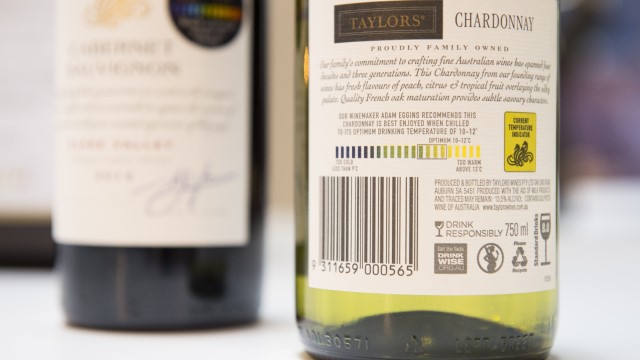
Australia’s wine industry has reacted angrily to a decision by Food Standards Australia New Zealand (FSANZ) to push forward with an amendment to the Food Standards Code requiring a pregnancy warning label on packaged alcoholic beverages sold in the region.
FSANZ announced on Monday that it approved an amendment to the Code and that Ministers responsible for food regulation have 60 days to request a review before it can become law.
Mitchell Taylor, managing director of Clare Valley wine business Taylors Wines voiced his disappointment at the FSANZ decision saying the bureaucracy “adds cost and benefits nobody”.
“We’re very disappointed about what they’re recommending,” the third generation winemaker told Inside FMCG.
“It’s patronising [to the consumer]. It’s almost taking the decision away from the individual.”
Taylors is one of many wine and alcohol brands that adheres to the voluntary Drink Wise labelling that discourages drinking while pregnant (label pictured above).
“Our industry has been very proactive about not encouraging people to drink while pregnant, without it becoming mandatory,” Taylor said.
“We have voluntarily come together as a group on a key message with a health warning that is recognised around the world. We’ve adopted that logo, we really don’t need this mandatory big health warning. It’s very unnecessary.”
The industry has had a turbulent start to the year with bushfires devastating many vineyards across the east coast. Taylor believes the decision will add to the industry’s woes.
“As a private business with all the other issues that we’ve got, with bushfires, with the drought, low yield, the last thing we need is more bureaucracy telling us what we must have all over our labels. We’re totally against it as a company.
The international standard is accepted in markets all around the world. Taylor said that creating different labels just for Australia and New Zealand would be an expensive exercise.
“We will have to make many, many different labels for different markets which is costly,” he said.
“The international standard helps with our uniformity and our efficiency and competing in these very competitive international markets.”
The FSANZ approval comes after a meeting between the Australia and New Zealand Ministerial Forum on Food Regulation, in October 2018, in which it was decided that a “mandatory labelling standard for pregnancy warning labels on packaged alcoholic beverages should be developed and should include a pictogram and relevant warning statement”.
The Forum pushed Food Standards Australia New Zealand (FSANZ) to develop the mandatory labelling standard as a priority and at pace.
Alcohol Beverages Australia, the peak industry body, called the decision “short-sighted” and said it will see costs passed to the consumer for very little health gain.
“Our industry has made it very clear to FSANZ that we support making the existing voluntary pregnancy labelling scheme mandatory. This decision is a bitter disappointment – these new labels will impose costs of another $400 million, for no significant improvement in health outcomes,” Alcohol Beverages Australia chief executive Andrew Wilsmore said.
















